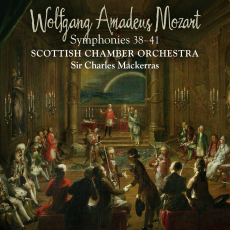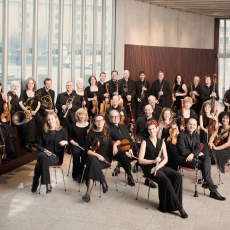Mozart Symphonies - SCO & Sir Charles Mackerras - Fanfare
Despite Michael Carter's adulatory and excellent reviews of Charles Mackerras's traversal of Mozart's symphonies on Telarc (27:1; 27:3), I could not help but wonder if Sir Charles, returning now to the final four, might have been secretly desiring to atone for the many sins perpetuated in his Telarc set. For I have never liked those recordings, any of them, primarily for their enforced dogmatism (and not just the repeats, present in this set also) and mercilessly rigid and inflexible manner. Add to the mix the excruciating presence of the harpsichord-what a mistake to include it in a "complete" set-and you have a situation that began as a beckoning and deliriously thrilling enticement ending up as a depressing and inexorable letdown. I mean, it could have been such a great set.
But interestingly enough, Sir Charles has returned to these works, this time without the aberrant "skeletons copulating on a corrugated tin roof" (Thomas Beecham), and the results, while not breaking down the doors to the kingdom of heaven at least show promise of leading us there. The choice of the Scottish Chamber Orchestra was also a fortuitous one, as they have learned over the last decade or so to play Mozart like madmen and women, with a stylistic fury and grace that surely put them at the top of the finest Mozart ensembles anywhere.
But interpretations are what we are all about here, and that subject must be tackled post-haste, despite the mention of what is some of the finest surround sound I have ever heard, giving a boost to the 37-member ensemble that feels more big-band than shrimp-size. What we have here are two phenomenal successes and two lesser lights, a disappointment to be sure, but even the pseudo-failures are not quite that, and one can go away with deep satisfaction when the listening is over and done with. The "Prague" is simply spectacular, its drama and complexity put on the line for all to hear (surely the most intricate of all Mozart symphonies, save for the last movement of the "Jupiter"), and Mackerras never slackens the tension. Yet his ever-quick tempos seem just right for this work, though one must wonder what Mozart was thinking when this Vienna-bred work was thrust into a series of Advent concerts! Prague was where this work would really come into its own, and contemporary reports say that it must have been heard over 100 times there. Though redolent of Figaro, it is ultimately Giovanni 's ghost that hovers over the middle movement, and Mackerras makes it move with an unseemly yet perfectly balanced pace. Klemperer comes to mind as another reading with the same sort of dramatic impetus, though his overall feeling, equal in fervency to Mackerras, is nonetheless different in temperament.
No. 39 has never felt right in Sir Charles's hands. Something about the genial but tough melodic structure of the piece, one moment fiery and another delicate and sensitive, seemed to elude him, and does so here as well. But when we get to the last movement, he discovers Mozart again and provides us with a perfectly judged Finale. I think Szell's account the very best of this work, not discarding Beecham and even Giulini, as proportionally perfection itself, Szell in particular knowing when to tighten the reins and to release some grip, and it is in this symphony more than the others that the repeat doctrine is most unpersuasive-after the first time through the B section of the last movement, repeating it just feels anticlimactic, no matter how much emphasis is put on the final chord.
The G-Minor starts far too hurried; I mean, why does it need to be soaring along at such an impish and fevered state? The music itself provides enough pathos in this most serious of Mozart's pieces. But I can even live with this (and the second movement is also on the quick side, though with a delicate and lovely lilt), though what happens when the same tempos are applied to the Minuet third movement crushes my spirit. There is something magnificently regal to the architecture of the Minuet, with the carefully built polyphony flying to the skies as the melodic lines build on one another. But taken at near-scherzo speed, the effect is lost and the gorgeous, colorful balloon deflates. All is not lost, as Mozart's music is immune from much, but it could have been so much better. The quicksilver final movement proves alternatingly light and heavy, zooming on to a very satisfactory conclusion. But Bruno Walter, who in my mind owns this work, takes a very different approach overall, infusing it with a wondrous and infectious lyricism that enhances the experience while letting Mozart take care of all the drama himself.
The "Jupiter," like the "Prague," is magnificent. Not since Bernstein's Vienna recording have I been so satisfied with a conception, and DG never gave Bernstein anything that sounds as good as this does. From first to last Mackerras latches onto the polyphonic nature of this work and is able to illuminate many, many passages with a subtlety and shifting emphasis on phrasing that is quite unlike any other recording I can think of. He neither dwells nor dotes on the slow movement, quicker than most but not rushed, and the Scottish muted strings sound every bit as good as their rivals in Vienna. The last movement is an orgy of glorious contrapuntal splendor in the conductor's hands, the coda granting a firewall of protection to the repeats that Mackerras still insists on taking, though to good effect here.
This set then, while still flawed, goes a long way toward avenging the problems in the Telarc recordings, and I can only hope that Linn will see fit to provide him with the same excellent Super Audio format as perhaps he works through some of the other symphonies. It would be a terrible shame were he to stop here. The silken strings of the SCO make a nice foil for the fruity, pungent brass (one may almost say dominant), and even with the questionable moments I have enumerated, this set is a feather in the Linn hat, and a definite recommendation for the exceptional performances.

